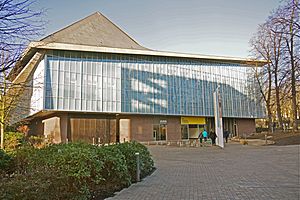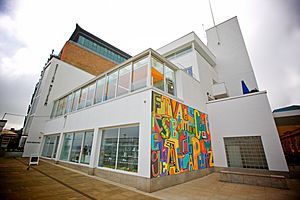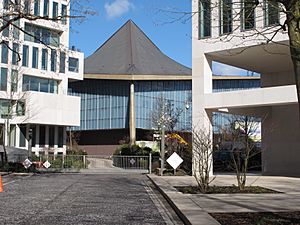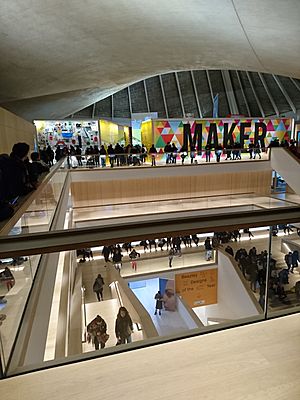Design Museum facts for kids

The Design Museum in Kensington
|
|
| Lua error in Module:Location_map at line 420: attempt to index field 'wikibase' (a nil value). | |
| Established | 1989 |
|---|---|
| Location | 224–238 Kensington High Street, London, W8 6AG England |
| Public transit access | |
The Design Museum in Kensington, London, England, is a cool place that shows off all kinds of design. You can see product design, like phones or chairs, and even fashion and building design. In 2018, the museum won a big award called the European Museum of the Year Award. The museum is a charity, which means all the money from ticket sales helps them create new and exciting exhibitions.
Contents
The Story of the Design Museum
The Design Museum was started in 1989 by a person named Sir Terence Conran. He worked with Stephen Bayley to create it. Before this, they had a very popular exhibition space. It was called The Boilerhouse and was at the Victoria and Albert Museum (V&A).
The First Home: Shad Thames
The museum first opened in an old banana warehouse. This building was on the south side of the River Thames in London. The warehouse was completely changed to look like a modern building from the 1930s. Many companies and designers helped pay for this transformation. The Conran group designed the museum itself. It had exhibitions on two floors. There was also a special "Design Museum Tank" area by the water. A large sculpture called The Head of Invention was placed near the museum. It was made by Sir Eduardo Paolozzi.
Moving to Kensington
In 2011, Sir Terence Conran gave a lot of money to the museum. This helped the museum move to a much bigger place. The new location used to be the Commonwealth Institute building. This building is from the 1960s and is very important. A design team led by John Pawson worked on changing it. The inside work was done by Willmott Dixon Interiors.
The Design Museum opened in its new Kensington home on November 24, 2016. This new spot gave the museum three times more space! It now has a learning center called the Swarovski Foundation Centre. There's also a large auditorium for talks and a special gallery. This gallery shows the museum's main collection for free. The new building was even featured on a TV show in 2019.
The move also brought the museum closer to other famous places. It is now near the Royal College of Art and the Victoria and Albert Museum. The Science Museum and Natural History Museum are also nearby.
Several people have led the Design Museum over the years. Deyan Sudjic became director in 2006. In 2016, Alice Black became a co-director. Since 2019, Tim Marlow has been the director and chief executive.
What You Can See Inside
The top floor of the museum has a permanent exhibition. It's called "Designer Maker User." This display shows important items from the museum's collection. You can also find a restaurant and a lounge for members here. There's a studio for artists and a space for events and other exhibitions.
On the first floor, there's a special library. It has books and materials about design and architecture. This library is great for students and researchers. It also keeps old records about the museum's history. The Swarovski Foundation Centre for Learning is also on this floor. It has a design studio and workshops. The museum's offices and a film studio are here too.
The ground floor has the biggest gallery. This is where the museum shows its temporary exhibitions. You can enter this area from two different streets. A main staircase connects all the floors. From the stairs, you can see the first and second floors. You can also look up at the unique roof.
Gallery Two is a tall space that covers two lower levels. It hosts temporary exhibitions about many types of design. These include architecture, fashion, and furniture. The Bakala Auditorium is also here. It seats 202 people. This space is used for talks, seminars, and other events. The basement has storage for collections. It also has spaces for preparing exhibitions and lockers for visitors.
Design Awards
The Design Museum has an award program. A company called Brit Insurance sponsored it from 2003 to 2011.
Designer of the Year
This award celebrates a single designer.
- 2003: Jony Ive
- 2004: Daniel Brown
- 2005: Hilary Cottam
- 2006: Jamie Hewlett
Design of the Year
This award looks at designs from the past year around the world. Design experts choose up to five projects. These projects fit into different categories. Before 2015, there were seven categories. These included architecture, transport, and fashion. Since 2015, there have been six categories. These are architecture, fashion, graphics, digital, product, and transport. Beazley became the exhibition sponsor in 2016.
- 2008: The 'One Laptop Per Child' project, designed by Yves Béhar
- 2009: Barack Obama poster by Shepard Fairey
- 2010: Folding Plug by Min-Kyu Choi
- 2011: Plumen 001 lightbulb by Samuel Wilkinson and Hulger
- 2012: The London 2012 Olympic Torch by BarberOsgerby
- 2013: The website "GOV.UK" by the Government Digital Service
- 2014: The Heydar Aliyev Center in Baku, Azerbaijan by Zaha Hadid
- 2015: Human-organs-on-Chips by Donald Ingber and Dan Dongeun Huh
- 2020: Teeter-Totter Wall by Ronald Rael and Virginia San Fratello
More to Explore
- List of design museums
- Design Council exhibition centre
See also
 In Spanish: Design Museum para niños
In Spanish: Design Museum para niños
 | Toni Morrison |
 | Barack Obama |
 | Martin Luther King Jr. |
 | Ralph Bunche |




